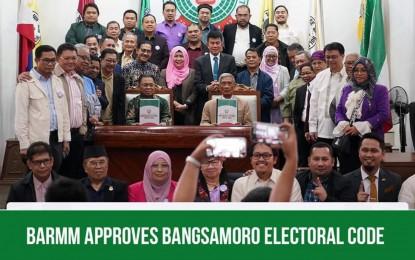Survey shows BARMM likely voters unaware of 2025 poll processes
COTABATO CITY – The majority of likely voters in the Bangsamoro Autonomous Region in Muslim Mindanao (BARMM) lack awareness of the new voting system and key features of the 2025 first-ever regional parliamentary elections, a research group said.
It was found out by the Institute for Autonomy and Governance, the leading authority on human security and governance issues in the BARMM, through its research unit.
With eleven months before the 2025 regional parliamentary polls and over three months before the filing of certificates of candidacy, the IAG believed a massive information campaign was inevitable to ensure enormous voter participation.
“With the elections only a year away, the findings highlight significant gaps in voter education,” the IAG said of its research findings.
The survey had a sample size of 384 respondents each from Cotabato City, Special Geographic Area, and the provinces of Lanao del Sur, Maguindanao del Sur, Maguindanao del Norte, Basilan, Sulu, and Tawi-Tawi.
The survey conducted from April 29 to May 14, 2024 among 3,072 respondents shows that 58.4 percent of likely voters have no knowledge at all of the voting system, while 24 24 have minimal knowledge.
“This is concerning as these will be the first-ever regional parliamentary elections in BARMM,” the IAG said in a statement released Thursday.
Former President Duterte signed on July 2018 the Bangsamoro Organic Law (BOL) that established the BARMM following a successful 2019 plebiscite.
This law, a product of peace talks between the Philippine government and the Moro Islamic Liberation Front (MILF), created a parliamentary system for the region whose members were appointed by Malacanang and extended once the transition period for another three years, ending next year.
The 80-seat Bangsamoro Parliament reflects this structure with 40 seats for party representatives (elected proportionally), 32 for district representatives (elected directly per district), and eight reserved seats (two each for non-Moro Indigenous Peoples and settler communities, and one each for traditional leaders, youth, women, and the Ulama).
The IAG researchers asked the respondents about their understanding of specific election features and the majority of respondents “admitted to limited or no knowledge at all.”
According to IAG research, the proportional representation system, which will allocate 40 seats to political parties in the 80-seat parliament, is a mystery to 88.9 percent of respondents.
Similarly, 89.1 percent are unaware of the voting process for district representatives for 32 seats, and 88.7 percent lack understanding of the sectoral assemblies that will elect representatives for eight seats.
About 85.9 percent of respondents have minimal to no knowledge that the BARMM chief minister will be elected by the 80 Members of Parliament (MPs) rather than directly by the electorate.
As to how the BARMM electorate gets information on the election and other issues, they said the social media and the internet. About 38 percent of the respondents said social media and the internet are their main sources of information.
Family and friends, however, as sources of information are most preferred by respondents (42.2 percent).
The IAG research found that village officials and government leaders are also sources of information (32.4 percent) while only 26 percent get information via radio and only one mentioned print media as a source.
IAG underscores the need for urgent and widespread voter education initiatives as only one percent of the respondents said he got information from the poll body.
Awareness of political parties
Information about the election process is sourced from the personal networks of respondents.
“Four out of ten respondents (41.2%) rely on family and friends for information about political parties, underscoring the importance of close social circles in BARMM politics, and 32 percent depend on barangay captains and other local leaders,” the IAG said.
Amid poor internet signals and frequent power interruptions in the BARMM provinces, the research found social media and the Internet serve as political information sources.
“Interestingly, social media acts as a digital extension of personal social circles, enabling online interactions with family and friends and fostering virtual relationships. This contrasts sharply with print media, which provides one-way communication from writers to readers without the interactive component,” the IAG research said.
Voter education is a must
The IAG said the Comelec and regional bodies like the Bangsamoro Electoral Office (BEO) have crucial roles in improving voter education in BARMM.
Given that the electorate is predominantly women, younger, poorer, and less educated, targeted strategies are essential.
With 83.4% of respondents reporting a monthly household income of less than P9,100 (US$158), 33.5% having only attended elementary school, 12.7% having no formal schooling, and 32.1% aged 17 to 29, educational initiatives must be tailored to this demographic.
IAG Research suggested that Comelec and BEO prioritize using visual and engaging content, such as illustrations, videos, comics, and cartoons, which are more accessible and attractive than text-heavy materials.
“Facilitating voter education through informal settings rather than formal interviews aligns better with the cultural context and communication preferences of the BARMM electorate,” the IAG said.
“Given the younger demographic, platforms like TikTok, Facebook, Messenger, Viber, YouTube and X should be the main channels for disseminating electoral information, as viral content can significantly expand reach by leveraging the influence of family and friends.
It also suggested that local radio ads and appearances on popular BARMM radio programs should be prioritized, given radio's significance as an information source.
The research group also suggested using educational materials about the electoral process using vernaculars like Meranaw, Maguindanaon and Tausug to enhance accessibility and comprehension.
It also said development agencies and civil society organizations can contribute significantly by partnering with Comelec, regional governments, and each other and maximize the social media platforms.
This sample size provides a 99% confidence level with a 1.77% confidence interval. Provincial margins are at a 95% confidence level with a 5% margin of error. (Edwin O. Fernandez)

